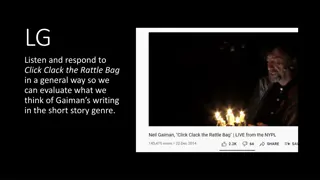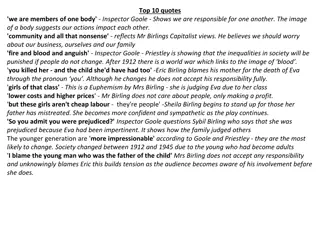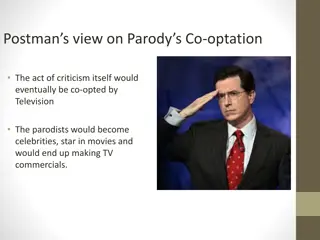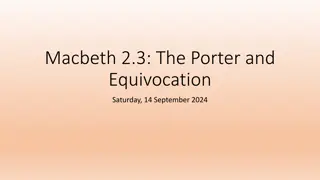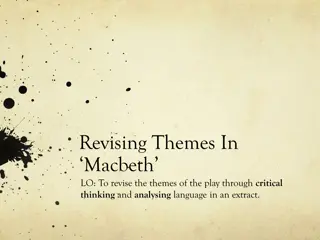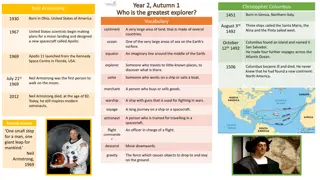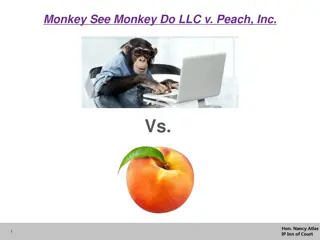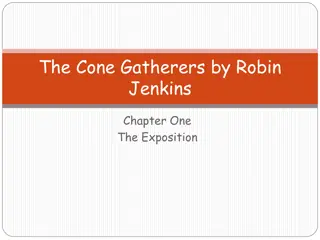Insights into Neil Simon's Play "Fools" and Its Themes
Neil Simon's play "Fools" delves into themes of stupidity, knowledge, and self-belief within a small Ukrainian village in 1890. Despite not winning awards, the play has garnered popularity in community and high school theatre. The significance of the title lies in characters' mistaken beliefs of a curse, influencing their actions. The setting of Kulyenchikov impacts the plot by facilitating rapid gossip due to its isolation. The importance of knowledge is highlighted through characters' transformations and choices based on newfound intelligence. Overall, "Fools" offers a unique exploration of human nature and perception.
Download Presentation

Please find below an Image/Link to download the presentation.
The content on the website is provided AS IS for your information and personal use only. It may not be sold, licensed, or shared on other websites without obtaining consent from the author.If you encounter any issues during the download, it is possible that the publisher has removed the file from their server.
You are allowed to download the files provided on this website for personal or commercial use, subject to the condition that they are used lawfully. All files are the property of their respective owners.
The content on the website is provided AS IS for your information and personal use only. It may not be sold, licensed, or shared on other websites without obtaining consent from the author.
E N D
Presentation Transcript
Fools By: Neil Simon
Neil Simon Neil Simon was born on July 4, 1927, in New York, New York. This play was originally supposed to be bad because Neil Simon was going through a divorce and he didn t want to make a profit because it would have been shared with his ex wife. This play didn t win any awards but was on broadway for 40 days and has become a staple for community theatre and high school theatre. Neil Simon has received many awards for his works including a Pulitzer Prize. Some of his most notable work is Brighton Beach Memoirs; Biloxi Blues , The Odd Couple , and Lost in Yonkers . He won around 30 awards for his writings. Neil Simon passed August 26, 2018.
Fools was published on April 6, 1981 at Eugene O Neill Theatre. Although the play has not won any awards, Neil Simon has won many awards for his other plays. He has won two Tony Awards for best play for his plays The Odd Couple and Lost in Yonkers. He has also won a Pulitzer Prize for Drama Award for his play Lost in Yonkers. Publication and Awards
Significance of title The significance of the title in Fools is that everyone in the play believes that they are cursed with stupidity and because they believe that they are stupid,they act like it. But In fact, there wasn t actually a curse and so they were fooled into believing that they were under the curse.
Setting -Fools takes place in a small, isolated Ukrainian village called Kulyenchikov in the year 1890. - Since Fools was written in the 1980 s, there are themes in the play that correlate to what was viewed as important at the time. Some examples of this are questioning the definition of knowledge and its importance as well as Lenya s feminist point of view gained at the end of the play. - The setting is significant to the plot of Fools because Kulyenchikov is a small and isolated town. This causes gossip (like the curse ) to spread quickly. It allows means that information will not reach Kulyenchikov quickly because of its isolation.
The Importance of Knowledge While this idea is present with Leon's persistence on the notion of intelligence, the theme is also shown at the end, when all of the characters gain their intelligence back. Each person does something different with their new knowledge, and while not all of them have inherently good impacts, they all change the course of their own lives. Lenya, who is made fun of as on of the stupidest characters, becomes a successful politician fighting for women's rights. Yechna, who spent most of her time selling unwanted items, finds herself owning most of the property in Kulyenchikov. This shows the importance of intelligence, and how it can and will affect everyone. You Are What You Believe The curse of Kulyenchikov states that if a teacher attempting to break the curse cannot do so within twenty-four hours, he too will become a fool. However, this does not happen to Leon - he remains intelligent, because he was never given a reason to believe he wasn't. Leon, himself, even states, "Kulyenchikov's lack of intelligence is self-inflicted, caused by fear and guilt and the relinquishing of your own self-esteem to a tyrannical power." This proves that the curse wasn't completely real, and the characters only regained their intelligence when they believed they had. Love is a Powerful Motivator Leon Tolchinsky is clearly a learned man, and being around such dramatically stupid people must have been a great annoyance. However, his immediate devotion to Sophia keeps him from leaving and forces him to continue trying to break the curse in order to love her. In the end, he accomplishes both, showing how immense his adoration of her really was. Themes
Central Conflict Leon has to educate Sophia to break the curse in Kulyenchikov in 24 hours. Evidence of this is how much time Leon spends with Sophia trying to teach her and it being a challenge for him because Sophia is considered the dumbest person in the village. Sub Conflict Leon has to find a way to make the people of kulyenchikov believe that they re no longer under the curse. Protagonist: Leon Antagonist: Count Youskevitch and Society In the beginning the Count and Leon fight for Sophia s hand in marriage, but as the the story progresses Leon has to trick them into believing they are not cursed anymore. Coinciding with the sub conflict
Brief Summary In a small, secluded, and cursed village called Kulyenchikov there was a schoolmaster named Leon Tolchinsky. This schoolmaster traveled far to this village to cure people of their progressing ignorance caused by a curse that they had since birth. During his time there, he is introduced to one of his students and she went by the name Sophia Zubritsky. Then the inciting incident occurred when Leon became infatuated with the sight of Sophia.This caused Leon to have a strong determination to educate Sophia, who was the only antidote to the curse, but education wasn t the only way to break the curse. Another man by the name of Count Gregor Yousekevitch could marry Sophia and the curse could be broken, but the issue arose that Sophia didn t love Count Gregor. Time began to run short and Sophia wasn t near educated enough to break the curse before Leon became under the curse as well. Once the time ran out Leon realized that the curse once he did not turn ignorant. As a last resort, Leon pretends to be stupid and convinces Count Gregor to adopt him as his son so he can marry Sophia and break the curse. Count Gregor then foils the plan and tells Leon he didn t actually adopt him so he could Sophia instead of Leon. In the end, Leon pretends to have an ancestor that is a Yousekevitch so he could marry Sophia. Thankfully, his plan worked and the curse was broken and everyone began to live a successful life.
Characters Leon Tolchinsky- 20-30 years old. Intelligent, stubborn schoolteacher. Vows to break the curse by educating and marrying Sophia. Sophia Zubritsky- 19 years old. She has a simple soul, but much smarter than she is given credit for. She craves knowledge and love. Only one who can break the curse. Dr. Nikolai Zubritsky- 40-50 years old. A true full through and through, who acts as an unofficial leader of the town. Has a tendency to belittle his wife and daughter. Lenya Zubritsky- 40-50 years old. Tends to belittle others, but she is much smarter than other give her credit for.
{ Unknown Vocabulary } Rudimentary (adj) involving or limited to basic principles ; relating to an immature, undeveloped, or basic form Intelligentsia (adj) a group of intelligent people Kopek (noun) a unit of monetary value in Russia and some other former Soviet Union countries, equal to $0.00015 Deficient (adj) not having enough of a specified quality or ingredient
Personal reactions! Selena - I enjoyed the play with all of it's clever humor and its deeper meaning somewhat hidden behind its comedy facade. Audrey - I found the play to be hilarious and enjoyed the various puns and jokes throughout the play. I also felt it had some great messages about the importance of education and pursuing what you believe in. Dianna - I have always adored stupid humor. To elaborate, if the statement is stupid or ridiculous enough than it s funny to me. And the play is filled with so many stupid statements, puns, and jokes. Like, for instance, in scene 3, page 25, Sophia came down the stairs and sat down, her parents began to celebrate the fact that she sat down beautifully.
Carissa - At first, I was disappointed with this play ; I didnt feel entertained by it, other than the few times I laughed. The style of play was new to me, so I didn t quite understand why it was interesting. However, the more I read it, the more it began to make sense to me. The quick pace and humor of Fools is not something to be taken seriously as other plays, and that difference is exactly what makes it so enjoyable. There is not a lot of reason to think hard about what happens - simply, this style of play was made to amuse, and Fools does its job well. Naomi - I found the play Fools to be surprisingly more entertaining than I thought it would be. Most of the plays I enjoy reading are dramatic, so it was interesting for me to read something aside from that. I really enjoyed the play even more when looking into the greater meaning of it. Haley - When I first read this play, I was a bit put off. I didn t expect Fools to be as charming and entertaining as it was. I quickly fell in love with the goofy characters and hilarious plot. The message is something that truly stuck out to me. I believe that the theme of this was to never let someone decide how smart you are or how capable you are of something because it will eventually turn you into a Fool .
Anna- Personally, I thoroughly enjoyed reading the play Fools. I enjoyed the twists and turns of the plot line and the surprises that occurred followed by the perfect amount of comedy. I did not see the ending coming whatsoever! Overall, this play was a joy to read and I would recommend it to anyone who has a flair for comedy. Lily- I thought the message of limitations one puts on themselves that Fools gives is important for everyone to hear. It is also hilarious and made me laugh out loud almost the entire time I was reading it. The balance of comedy with an important message was what made the play so effective. Kristyna Locke- The way that the play was written with the amount of comedy and the serious note twisted in really made me get into the play. The ending was a total surprise. Leigh- As I read the play Fools I wasn t exactly hooked on the plot, but rather to the message that it was trying to tell the audience. This is mainly because I was able to relate to the message. A message being no one can define who you are . When I was a freshman in highschool I lost track on who I was. I was so prone to get people to except me especially the non-freshman, that I lost track on who I was. Because I was trying to become someone that I thought everyone wanted to be. It wasn t only until recently that I realized that the only way to get people to like me was to be myself. I would definitely recommend this play to anyone who has trouble discovering who they are.
Timi - I didnt know where the play was going in the beginning, but as time went on I fell in love with this play. It s so stupid that it s endearing and charming. Even though I enjoyed the play I did find the ending a bit rushed right after Leon found out the cursed wasn t real. I would read again. Tonilee - This play has a deeper meaning than the surface puts out. I found a true theme that I can take to heart and meditate on. I was really surprised. But a good kind of surprise
Bibliography https://www.nytimes.com/1981/04/07/theater/theater-fools-by- simon.html https://www.broadwayworld.com/tonyawardspersoninfo.php?nomnam e=Neil%20Simon http://www.pulitzer.org/winners/neil-simon


